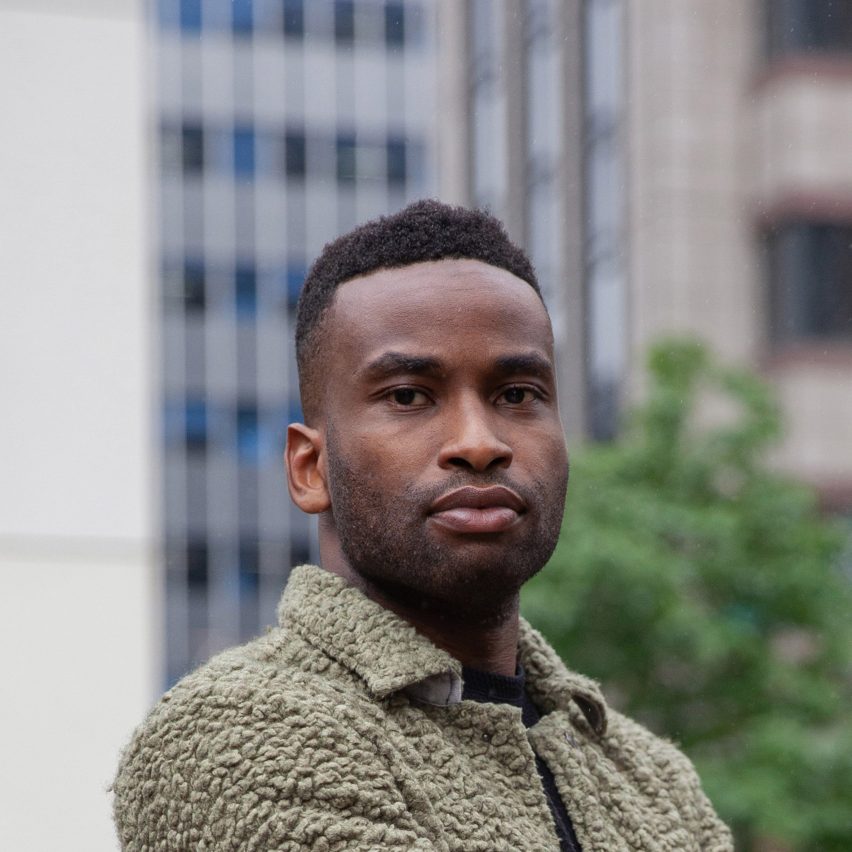
Grassroots organisations will "be holding me to account" says RIBA president Muyiwa Oki
Muyiwa Oki, the youngest-ever and first Black president of the RIBA, speaks with Dezeen about ambitions for his term and the grassroots campaign that supported his election in this interview.
Oki, aged 32, was inaugurated as the Royal British Institute of Architects (RIBA) president on 1 September having been put forward as a candidate by an informal group of young architects seeking a workers' representative.
An employee at global construction company Mace, Oki is the first RIBA president to be an architectural worker.
Most previous RIBA presidents, including Oki's predecessor Simon Allford of Allford Hall Monaghan Morris, have been directors of their own studios.

Oki hopes to rebuild the connection between the 189-year-old institution and the next generation of architects during his two-year term.
"For quite a long time there has been an establishment of someone who runs their own practice in office, and in some ways we have lost the connection with the grassroots," he told Dezeen.
"With me here, I'd have that relationship with grassroots and I can bring a connection and bridge that gap between the established practitioners and young up-and-coming next-generation practitioners, so we can move forward in a more positive direction."
Oki was put forward as a presidential candidate by a group of grassroots organisations, including Future Architects Front (FAF) and Section of Architectural Workers (SAW), after winning in a vote against other architect workers.
It followed the emergence in March 2022 of an open letter signed by FAF, SAW and others calling for "the first worker at the helm" of the RIBA.
Now, Oki said he feels a sense of responsibility to represent the architects who voted for him, encouraged his campaign and signed the open letter.
"We wrote the letter and it got people excited," he explained.
"The organisation of those groups was very loose, but I think that was one of the winning reasons why it worked so well – it was a collective as opposed to one person telling people what to do," he added.
"There was a lot of sharing of ideas and I'm going to continue to have a relationship with them, and they can be holding me to account."
In maintaining a relationship with these groups, Oki hopes they will relay honest feedback that he can act on during his term.
"I hope they're going to be critiquing things that I do because I would like to be honest and understand what it is the architecture profession is getting up to," he said.
"We need to create avenues to get more feedback and one way is to be in touch with those groups."
Education reform is one of the main issues Oki plans to tackle as president.
In February this year, the Architects Registration Board (ARB) announced plans to scrap the current three-part structure – which exists as Part 1, 2 and 3 – and replace it with a more flexible method that supports different pathways into architecture.
The RIBA has previously stated its opposition to the changes.
"We are looking at reimagining the future of education with the ARB and one thing I would like to see is more flexible avenues of getting into the register," said Oki.
"The cost of living crisis and who gets to finish architecture education is a big issue, and this is why we're talking about going further and faster in education reform."
"If we can update this almost 50-years process that we've had, it would be very good for the next generation," he added.
British architecture was rocked in 2022 by a report detailing bullying, racism and sexual misconduct by staff at the prestigious Bartlett School of Architecture.
"If there is some positive to the Bartlett scandal it's that it's given us a kick up the bum to actually make a change in the organisation of education," said Oki on the issue.
"One key thing is we are going to try to engage more and be more open, and get in the voices of the membership and general profession."
Sustainability and encouraging a "culture shift within the profession" towards celebrating retrofit over new construction will also form a central plank of his presidency, Oki said.
"Over the years, rightly or wrongly, we have been exalting new builds as the coup de grâce for architectural practice," he said. "There's been a focus on new and modern is best."
"Bringing the conversation into this retrofit space and trying to solve big issues like climate emergency, I think are two things you could expect [from my presidency]."
Since being elected last year, Nigerian-born Oki said he has been overwhelmed with positive messages and support from RIBA and the wider architecture profession.
"Being the first of anything is somewhat daunting because there is no blueprint for what you should do, but I've also had a lot of positive energy," he said.
Oki studied at the University of Sheffield and before joining Mace worked at Grimshaw Architects, where he was involved in the overhaul of Euston Station in preparation for HS2.
"Coming from an immigrant family, there are only three or four things your parents want you to do, like a doctor or a lawyer, and those were never exciting or creative enough," he said.
"I think architecture gives you the opportunity to serve the common good – you can look back over your history of works and projects and people who've been impacted and have a positive feeling and sense of joy out of it."
The photography is by Ivan Jones shot for the RIBA Journal unless stated.
Dezeen In Depth
If you enjoy reading Dezeen's interviews, opinions and features, subscribe to Dezeen In Depth. Sent on the last Friday of each month, this newsletter provides a single place to read about the design and architecture stories behind the headlines.